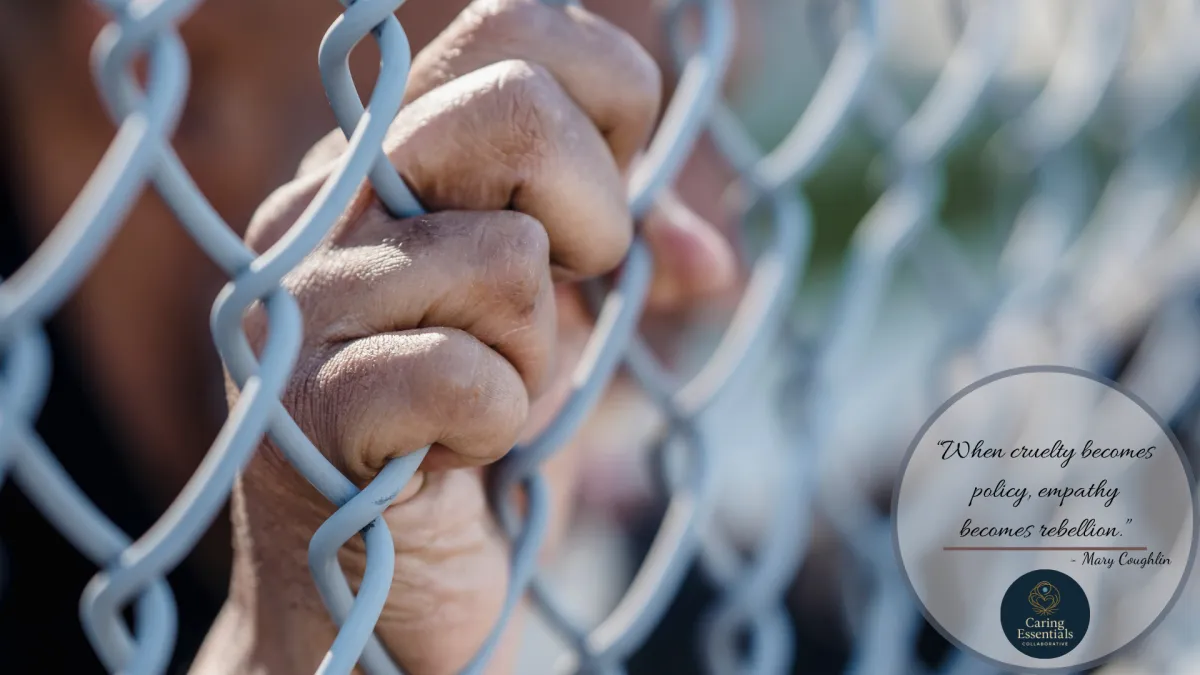
When Politics Needs Pain: The Real Reason the Immigration Deal Died
“When cruelty becomes policy, empathy becomes rebellion.” — Mary Coughlin
When Politics Needs Pain: The Real Reason the Immigration Deal Died
A Moment of Courage — and Its Undoing
There was a moment — brief, fragile, almost unbelievable — when it seemed the United States might finally take a step toward healing one of its deepest wounds.
A bipartisan group of senators had spent months building an immigration reform bill that balanced compassion with control, security with humanity. It wasn’t perfect — legislation rarely is — but it was progress. It promised to bring order without sacrificing empathy, to restore fairness to a system defined for too long by chaos and cruelty.
And then, with a single directive from a man still campaigning for power, it was gone.
A Moment of Courage — and Its Undoing
In early 2024, the Biden administration worked alongside a small coalition of Democrats, Republicans, and Independents to craft what many called the toughest yet fairest immigration bill in decades. It invested billions in border security, streamlined asylum processes, and created pathways that protected both sovereignty and dignity.
For a moment, it seemed that Washington remembered how to govern for the common good.
But as the bill neared the Senate floor, Donald Trump — then a candidate — publicly ordered Republicans to walk away. He warned that passing the bill would “give Biden a win.” And so, the deal collapsed.
Not because it was flawed.
Not because it failed to strengthen the border.
But because it might have shown that compassion and security are not opposites.
That was its real threat.
The Politics of Pain
When cruelty becomes a political strategy, suffering becomes the message.
Fear becomes the fuel.
And human lives — the children at the border, the families split by deportation, the asylum seekers sleeping on concrete floors — become props in a performance of power.
Trump didn’t just oppose a bill. He opposed the possibility of healing.
The immigration compromise would have made it harder to justify the spectacle of suffering — the images of chaos that help fuel “law and order” campaigns. In trauma-informed language, it would have interrupted the cycle of re-traumatization — and that interruption was precisely what some feared.
A healed system doesn’t need saviors.
A calm border doesn’t feed outrage.
A humane solution doesn’t rally a base addicted to fear.
A Trauma-Informed Lens
In trauma-informed care, we learn that safety and connection are prerequisites for healing. Systems built on fear and control, however, require people to remain unsafe — reactive, divided, and distrustful.
The same pattern plays out at a national scale.
A trauma-driven politics thrives on dysregulation — keeping us anxious, polarized, and primed for blame.
That’s why bipartisan compassion is such a threat. It interrupts the trauma loop. It reminds us that our strength lies not in domination but in relationship — in our capacity to care.
Trauma disempowers. Compassion restores.
That’s as true in the NICU as it is in a nation.
The Human Cost of Killing Hope
The death of that immigration bill wasn’t just a legislative failure; it was a moral one.
Behind every policy are people — parents seeking safety for their children, workers who have become essential but invisible, dreamers who have spent their entire lives pledging allegiance to a nation still unsure if it wants them.
To kill reform is to choose their continued suffering.
To block compassion is to choose cruelty as a campaign tool.
We cannot call ourselves a nation of laws and liberty while weaponizing fear against the very people who remind us what liberty means.
Reclaiming the Narrative
It’s tempting to believe this is just politics as usual. But the truth is simpler and starker: we are being asked to choose between two stories about who we are.
One story says safety requires separation. That compassion is weakness. That order demands cruelty.
The other says safety and humanity are not opposites — they are interdependent. That we can secure borders and protect dignity. That the measure of our greatness is how we treat the most vulnerable among us.
That’s the story this bill tried to tell.
And it’s the story we must keep telling, even when those in power choose silence or scorn.
An Invitation
We can’t legislate compassion into existence, but we can refuse to let cruelty define us.
We can speak up for policies that honor both safety and belonging.
We can remember that borders aren’t just lines — they’re choices about who we believe deserves to belong.
In trauma-informed care, we say: nothing changes until someone feels safe enough to care again.
Maybe that’s true for nations, too.
Take care and care well,
Mary
